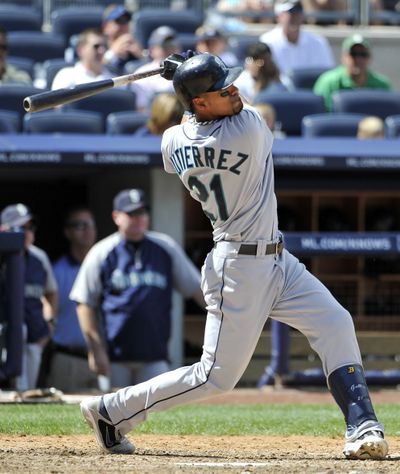Seattle’s Franklin Gutierrez appreciates another chance

PEORIA, Ariz. – Franklin Gutierrez knows he’ll never be that same player again.
The 2009 season, his first in a Mariners uniform at age 26, was something he and fans won’t soon forget.
They remember the easy grace with which he patrolled center field – the gliding steps, the perfect routes to balls and the ridiculous catches.
They think about the potential at the plate and the numbers he looked capable of putting up. That season he hit .283 with 24 doubles, 18 homers and 70 RBIs with a .764 OPS and seemed to be just growing into his potential as a hitter.
But that player is gone.
He was lost in an onslaught of injuries and illnesses, myriad missed games, extended trips to the disabled list and now, finally, a diagnosis of something he’ll deal with the rest of his life.
By appearance, Gutierrez, now 32, still looks a lot like that player – lean, strong and in better shape than most of his contemporaries. Still, he’s seen his baseball mortality, spending last season at home in Miami trying to figure out how to live with ankylosing spondylitis, an arthritic condition, and what he would need to do to play baseball again.
Sitting at his locker in the Mariners’ spring-training clubhouse, the guy everyone calls “Guti” no longer is a potential All-Star or an enigmatic injury waiting to happen. Now he’s just a player trying to hang on to the one thing he’s always wanted to do.
“After missing a year, I’m very grateful to be back here,” he said, looking to his right and seeing Endy Chavez at his locker. “I’ve been here for a long time now. I just want to give it a shot one more time to see if I can do it.”
Gutierrez signed a one-year, $1 million contract with the Mariners in December 2013 in hopes of contributing in the 2014 season. But in the weeks leading up to spring training, he realized that the issues with his condition weren’t going to allow it to happen.
The disease, which is an arthritic condition that affects his hips and lower body, was just too unpredictable after he was diagnosed. So Gutierrez informed the Mariners he wouldn’t be available. They placed him on the restricted list and he forfeited his salary for the season.
“Last year, I was trying to get used to all the things I was feeling and managing that,” he said. “I’m feeling better. I’ve been taking a lot of treatment with the thing that I have and trying to manage the symptoms.”
The diagnosis of the disease was bittersweet. Gutierrez finally had a reason for all the pain and discomfort he had felt. But knowing that he’d have to live with it the rest of his life hurt worse than a fastball to his ribs.
“It was hard, man,” he said. “I didn’t know what was causing pain in my joints and stiffness in my muscles. It’s something I’m going to have my whole life. It has treatment, but there isn’t any cure. It’s something I have to deal with every day.”
What Gutierrez couldn’t deal with every day was the thought of not exhausting options to play again. He couldn’t walk away from baseball until it was taken away from him.
“Last year was hard, man, because without playing, I had too much time to think about stuff,” he said.
Thoughts of being done with the game haunted him.
“This is part of our life,” he said. “I’ve been doing this since I was a little kid. Just being out of it was kind of depressing.”
Sure, he relished the chance to spend time with his wife and son, doing things he had not done during the season.
“But it was hard to watch the games on TV and watch my friends play,” he said.
That yearning for the game carried him through workouts and pushed him to play winter ball in hopes of earning another chance with a big-league team.
The Mariners weren’t afraid to sign him to a minor-league contract. It could be viewed as a courtesy after all he’s been through, but there was little risk.
“I’m glad to be here again and doing the things I need to do,” he said. “Obviously, my body doesn’t feel the same as when I was 21 or 22 years old, but that’s part of it. I have to deal with it.”